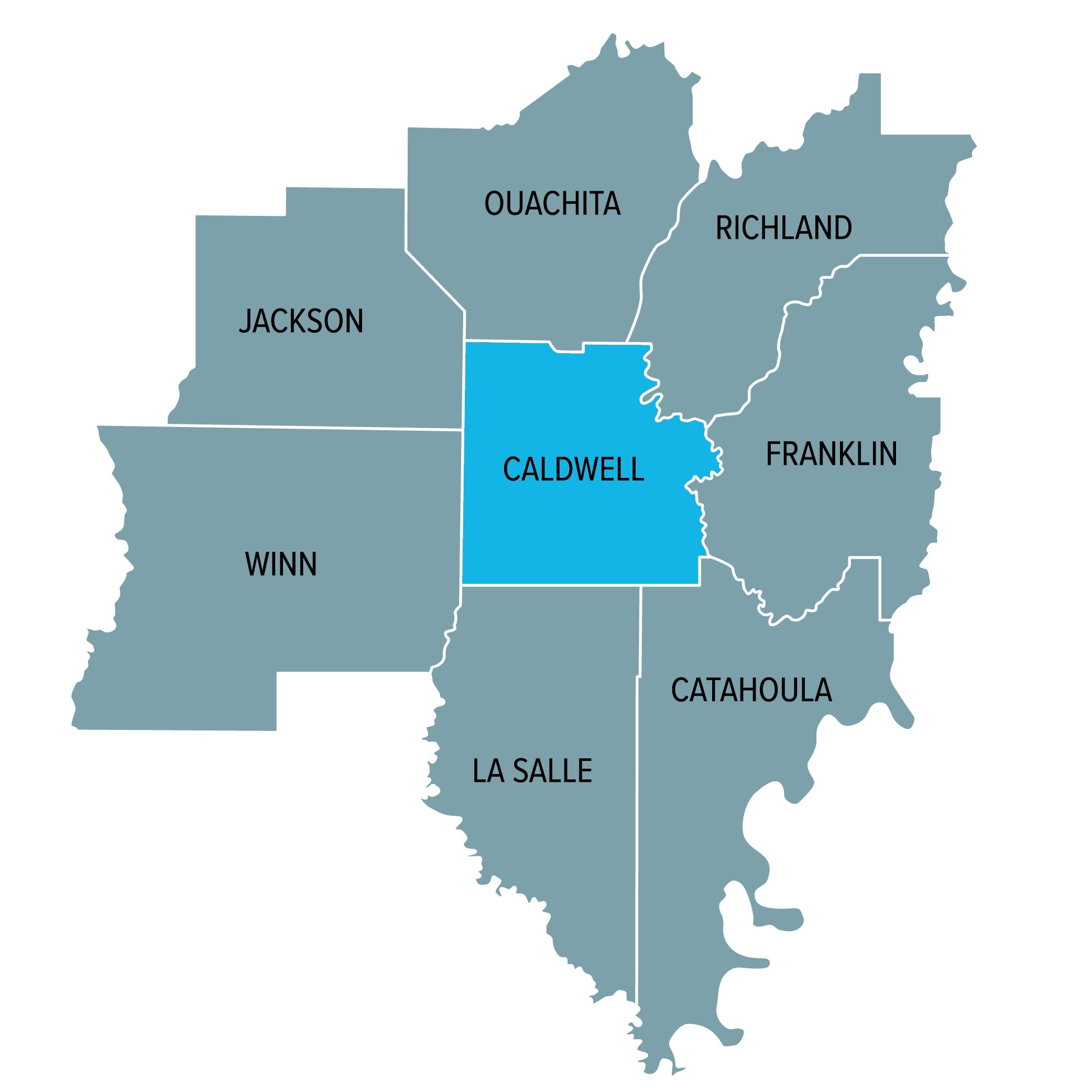
The History of Caldwell Parish
Louisiana is divided into sixty-four parishes and the story of these parishes is rich in history and folklore. Over these lands have flown the flags of France, Spain, Great Britain, the Confederacy, and the Stars and Stripes. These parishes go to make up the greatest state in the Union, a state where sunny skies and warm tropical breezes bathe the hills and rustle in the bayous. But behind the whole pattern is a story of man’s conquest. A story of industry, of rich farm lands, a story of oil and minerals, of lumber, the sea and the river; a story of progress and discovery and a prophecy of the future. Such is the story of Louisiana’s great parishes. This is the story of one of these parishes, Caldwell, created in 1838 from Catahoula and Ouachita, and of a town named Columbia, the parish seat, which was settled eleven years before, upon the site used as a river landing even prior to the time the settlement came into existence.
Caldwell Parish was authorized in an act of legislature which was signed by Governor E. D. White on March 6, 1838, and was land taken from Ouachita and Catahoula Parishes, with Ouachita furnishing the major portion. The Ouachita River meandered through the new parish near its center, with alluvial lands on its east banks and hill lands on the west.
The new parish was divided into five wards on March 30, 1838 at a meeting of Justices of the Peace James Gray, Jacob Humble, Fleming Noble, Thomas Rutland and James Woolridge, with the assistance of newly appointed Judge William P. Snow. John Ewing, James Gray and James Woolridge met with Judge Snow on the following May 22nd as the new Police Jury. Columbia was named the parish seat, although settlement of Copenhagen was given consideration.
One of the reasons Columbia was chosen as parish seat may have been because of Columbia’s location by the Ouachita. The River was easily approached from Columbia and could be forded when the river was low. Making it possible for the settlement to become a trading post available to both river and land routes.
Also at this meeting on May 22 it was ordered that a court presided over by Judge Henry W. Boyce be held in the residence of Fleming Noble until a courthouse could be erected. The courthouse square was donated to the public by Henry Human, Richard King, James McCoy and Fleming Noble. This deed was signed on August 21, 1838, and a log courthouse and jail were built soon afterwards. The first courthouse and latter one of brick was both destroyed by fire. The latter one was replaced by a third brick building shortly after the Civil War. This structure stayed in use until 1937, when it was torn down to make way for another dedicated January, 1938. This structure was later remodeled and added on to.
From the middle 1800’s to the early 1900’s, heyday of the romantic steamboat era, Columbia vied with Trenton and Monroe in importance as a River port and trading center. There was a good harbor at Columbia and it became a busy port for boats from New Orleans, St. Louis and other distant points. Farmers from surrounding areas, as far as a hundred miles, would bring cotton to Columbia to be shipped by water.
The last cotton shipped from the parish was in 1931. According to old cotton farmers, who recalled the year, the railroad began to move into the parish and in 1931 it cost $5.00 to ship a bale of cotton by rail. A good bale of cotton only brought about $25.00, and it took twenty percent of that for transportation. But, that year an old steamboat captain shipped it for $1.00 a bale. Needless to say, he hauled almost every bale of cotton out of Columbia. However, by the next year, the captain had died and the farmers were forced to rely on the services of the railroad. This has been over 85 years ago and ever since the river traffic and cargo on the river at Columbia has been almost at a standstill; however, everything else that the parish has to offer has been booming.
Great transportation has been provided by the railroad and Highway 165, which runs directly north-south through the parish. Also, the agricultural value of the parish has been thriving. In the early days of its history and immediately following the Civil War, the farmers of the parish raised corn and cotton exclusively, but in more recent years they have turned their attention to other crops until now their products are as varied as can be found in any section of the state. Stock raising has become an important industry here, as well as pulpwood. It is said that Caldwell has many resources, if developed, to make the parish one of the most outstanding in the state.

Written by:
Eugene Dunn
Caldwell Parish Clerk of Court
From July 1, 1984 to June 30, 2016
